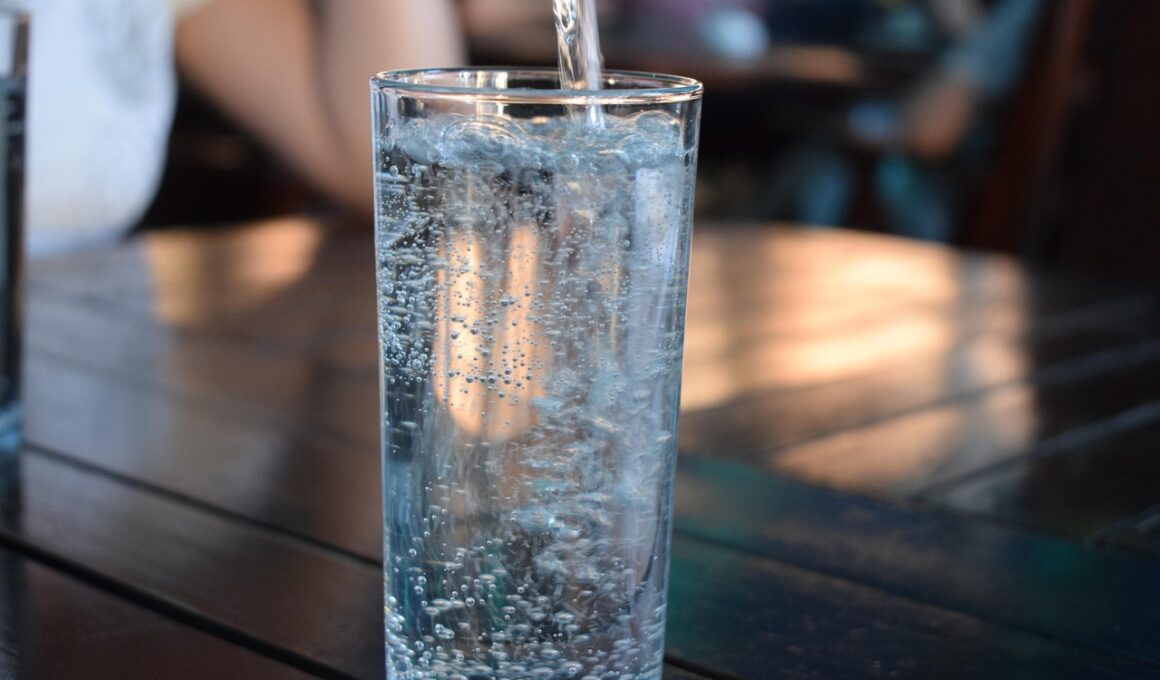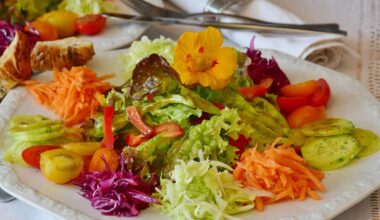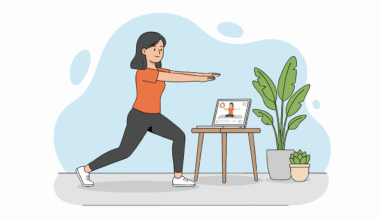Best Hydrating Beverages for Seniors to Support Physical Activity
Staying hydrated is crucial for seniors, especially those active in physical activities. Hydration supports energy levels, improves joint health, and enhances overall well-being. Proper hydration is vital for seniors during exercises as it helps maintain the body temperature, keep the joints lubricated, and allows for the efficient transportation of nutrients. Drinking enough fluids can also prevent fatigue, dizziness, and heat stress. It is essential to choose hydrating beverages that are suitable for seniors’ specific health needs. Some drinks contain sugars or caffeine, which may not be ideal. Seniors should aim for beverages that contribute to daily fluid intake without excessive calories or added sugars. Thus, knowing the best hydrating options available is necessary. Common hydrating beverages include water, herbal teas, and certain fruit juices. These options can ensure seniors receive the hydration they require, allowing them to enjoy their activities while safeguarding their health. Additionally, incorporating foods with high water content, like fruits and vegetables, can complement fluid intake. Making hydration a priority is a simple yet effective way to support a healthy lifestyle.
Water: The Ultimate Hydration Source
Water is the most fundamental and essential beverage for hydration. It helps regulate body temperature and supports essential bodily functions. Seniors should strive to drink at least eight 8-ounce glasses of water daily, considering individual needs may vary. Staying proactive by carrying a water bottle can serve as a reminder to drink throughout the day. Water may be preferred, but many seniors find it difficult to consume plain water due to taste fatigue. In such cases, adding lemon, lime, or cucumber slices can enhance flavor while remaining low in calories. Senior hydration can also be boosted by consuming flavored sparkling water. This bubbly drink provides hydration with an appealing taste without added sugars. For those who struggle to drink enough water, including broth-based soups can also significantly contribute toward hydration goals. It’s crucial to listen to your body and drink before feeling thirsty. Symptoms like dry mouth and increased thirst signify a need for more fluid intake. In particular, seniors engaging in physical activity should be even more mindful of their hydration levels to maintain optimal performance.
Herbal teas are another fantastic way to stay hydrated, offering variety and flavor without caffeine. With many options available, herbal teas can cater to different tastes and preferences. Some popular herbal teas include chamomile, peppermint, and hibiscus. They are low in calories and beneficial for hydration. Moreover, herbal teas may possess additional health benefits, such as anti-inflammatory properties or soothing effects. Notably, seniors can enjoy these teas warm or iced, making them versatile for any season. Drinking them regularly can provide a comforting ritual while enhancing hydration levels. Seniors should consider the caffeine content in some teas, as caffeine can lead to dehydration in excess. Therefore, caffeine-free options are preferred for regular consumption. It’s essential to choose quality teas free from artificial additives or sweeteners that could undermine health benefits. Infusing herbal teas with natural flavors like ginger or lemon can add unique tastes and health advantages. Ultimately, incorporating herbal teas into daily hydration routines can provide both enjoyment and essential hydration, helping seniors stay refreshed and revitalized throughout their active days. Hydration can enhance exercise recovery, improve joint function, and boost overall wellness.
Fruit Juices: Choosing Wisely
Fruit juices can be enjoyable and hydrating options for seniors; however, it’s essential to choose wisely. While juices can offer vitamins and minerals, many commercial varieties contain added sugars that can lead to unwanted weight gain and other health problems. Ideally, seniors should opt for 100% natural fruit juices without any additives or preservatives. Juices such as orange, pomegranate, and cranberry provide vitamins like vitamin C and antioxidants, supporting immune health. However, moderation is key. Instead of drinking 8 ounces at a time, diluting juices with water can reduce sugar intake while still enhancing hydration. This practice provides a gentle introduction to fruit-flavored options without compromising health. Additionally, seniors might want to consider juicing their fruits or choosing smoothies made with whole fruits, as this helps retain fiber, improving digestive health. Hydration doesn’t solely rely on liquids; the inclusion of fruits like watermelon, oranges, and strawberries offers moisture and nutrition. This approach encourages a balanced diet while maintaining hydration needs. Incorporating fresh fruits into meal plans encourages hydration, enhances energy levels, and supports overall health among older adults.
Coconut water has gained popularity as a natural sports drink, making it an excellent hydrating option for seniors. It is rich in electrolytes such as potassium, which replenishes lost nutrients after physical activity. This refreshing beverage provides hydration without excessive sugar or calories, making it suitable for those watching their sugar intake. Moreover, coconut water contains natural antioxidants that help reduce oxidative stress in the body. This attribute can support seniors’ overall health, particularly in promoting healthy aging. The light taste and variety of flavors available make it an appealing drink for many. Additionally, seniors should check the labels to ensure they are choosing coconut water without added sugars, as some brands may include unnecessary ingredients. Consuming coconut water can enhance hydration post-exercise, especially for seniors engaging in light to moderate physical activities. It is also an excellent substitute for traditional sports drinks, which often contain excess sugars and artificial flavors. Remember to listen to your body and adjust intake according to activity levels. Ultimately, coconut water can be an enjoyable way to stay hydrated while supporting active lifestyles in seniors.
Beverages to Avoid
It is also essential for seniors to recognize which beverages to avoid in their quest for hydration. Certain drinks, particularly those high in caffeine or sugar, can contribute to dehydration rather than alleviate it. Beverages like coffee or high-sugar sodas, while tempting, may lead to unwanted health problems and should be consumed in moderation. Excessive caffeine consumption can accelerate dehydration due to its diuretic effects, causing seniors to lose more fluids. Additionally, sugary drinks can lead to weight gain, increased risk of diabetes, and other chronic diseases. Alcohol can also hinder hydration and impair overall wellness. Drinking alcohol can disrupt the body’s balance of fluids, making it harder to hydrate effectively. Instead, seniors should focus on healthier alternatives that provide hydration and essential nutrients without adverse effects. Choosing nutrient-dense beverages is key to maintaining hydration; options like infused water or herbal teas can be beneficial. Emphasizing whole fruits and veggies in drinks, as opposed to sugary juices and sodas, can ensure health benefits without compromising hydration. Being aware of drink choices can significantly improve overall health and hydration for active seniors.
Ensuring proper hydration for seniors goes beyond just drinking fluids; it’s about establishing a routine that incorporates hydrating options throughout the day. Planning regular hydration breaks can encourage active seniors to drink more and stay mindful of their fluid intake. Setting reminders for drink breaks or introducing refreshing beverages during meals can be effective strategies. Additionally, incorporating water-rich snacks like fruits and vegetables can be a practical way to supplement hydration. Having visually appealing drinks and snacks can pique interest and make hydration more enjoyable. Seniors may find that making hydration a social activity can encourage drinking more fluids. Hosting gatherings featuring various hydrating beverages promotes engagement and socialization, enhancing their overall experience. Drinking with friends or family not only provides necessary hydration but also fosters a sense of community. Consulting with a healthcare professional for personalized hydration advice can be beneficial. Customizing hydration plans according to individual health needs ensures that seniors can maintain their active lifestyles effectively. By prioritizing hydration and making mindful choices, seniors can support their health and physical activities while enjoying a diverse range of beverages.
Conclusion: Prioritizing Hydration
In conclusion, hydration plays a significant role in seniors’ health, particularly for those engaged in physical activities. Understanding the best hydrating beverages promotes well-being and enhances overall performance during activities. Water should remain the primary source of hydration, supplemented with options like herbal teas, coconut water, and 100% fruit juices, while being mindful of what to avoid. Factors such as personal preferences, health conditions, and activity levels will determine individual hydration needs. It is crucial that seniors understand the importance of being proactive about their fluid intake and recognizing the signs of dehydration. By developing hydration habits, incorporating a variety of beverages, and listening to their bodies, seniors can thrive in their active endeavors. Consciously prioritizing hydration can lead to improved energy levels, better joint function, and enhanced overall well-being. With the right strategies, seniors can confidently engage in physical activities, knowing that they are adequately hydrated. A commitment to hydration will ensure they can enjoy their favorite activities while promoting a healthier and more vibrant lifestyle. Ensuring sufficient hydration is not just a choice; it’s a vital part of supporting a happy and active senior life.


